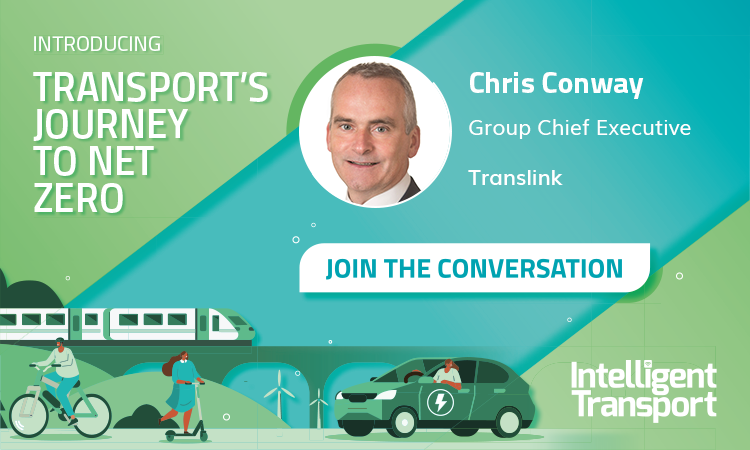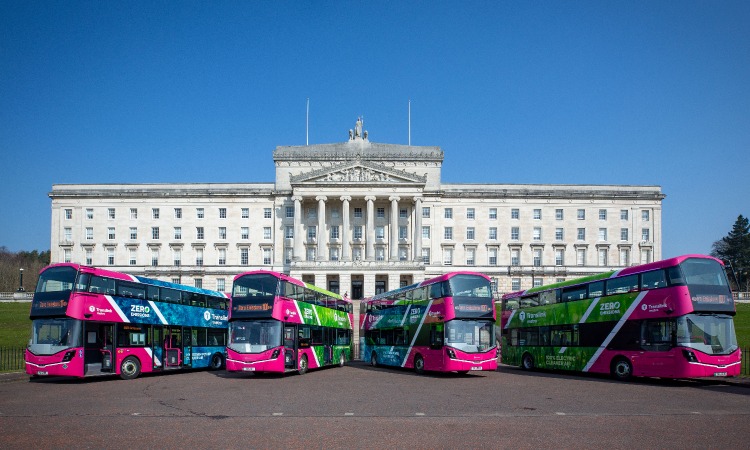Transport’s journey to net zero: Partnership is key for the realisation of sustainable road spaces, says Translink NI
- Like
- Digg
- Del
- Tumblr
- VKontakte
- Buffer
- Love This
- Odnoklassniki
- Meneame
- Blogger
- Amazon
- Yahoo Mail
- Gmail
- AOL
- Newsvine
- HackerNews
- Evernote
- MySpace
- Mail.ru
- Viadeo
- Line
- Comments
- Yummly
- SMS
- Viber
- Telegram
- Subscribe
- Skype
- Facebook Messenger
- Kakao
- LiveJournal
- Yammer
- Edgar
- Fintel
- Mix
- Instapaper
- Copy Link
Posted: 14 October 2022 | Chris Conway - Translink | No comments yet
In the latest instalment of Intelligent Transport’s exclusive sustainable transport Q&A series, Chris Conway, Group Chief Executive of Translink, discusses the importance of encouraging modal shift towards public transport in order to achieve the company’s climate action targets, and highlights the significance of partnerships between transport operators and local councils in encouraging the development of active travel infrastructure.


The ever-pressing challenges of poor air quality and traffic congestion have been a key focus for the transport industry, as operators and authorities strive to achieve their net zero targets. How big a part does the decarbonisation of public transport play in reducing Northern Ireland’s carbon emissions?
In Northern Ireland today, transport represents 35 per cent of all energy used and over 20 per cent of all greenhouse gas emissions”
In Northern Ireland today, transport represents 35 per cent of all energy used and over 20 per cent of all greenhouse gas (GHG) emissions.
To compound the issue, transport emissions are on the increase in the country, despite technology improvements. A recent Northern Ireland Statistics and Research Agency (NISRA) report has highlighted that, whilst Northern Ireland’s overall emissions have decreased by 18 per cent since 1990, transport-based emissions have actually increased by 22 per cent.
This shows that not only are transport emissions not being addressed, but they are negatively impacting on the good work that is being done in other sectors. Therefore, this must be dealt with as a matter of priority and needs to involve a much bigger modal shift towards public transport, along with the decarbonisation of public transport. Together, these will play a significant part in Northern Ireland’s carbon reduction targets.
What are the immediate challenges that Translink is facing in decarbonising its public transport fleet?
The immediate challenges faced with decarbonising our public transport fleet is the increased costs, along with the significant new infrastructure requirements, with both electric charging and hydrogen refuelling. This will require ongoing political and stakeholder support with a need for multi-year budgets to help to plan investment and technological advancements so that our ambitious targets of delivering a 50 per cent reduction in carbon emissions by 2030, a fully net zero fleet by 2040 and climate positive status by 2050 can be achieved.
What projects does Translink currently have in the pipeline that will help to achieve a more sustainable transport system in Northern Ireland?
Translink has a bus fleet transition plan to net zero by 2040, with all future bus procurements planned to be zero-emission. We have procured 140 zero-emission buses and have 100 of these in service, with the majority of these being battery electric vehicles. We have 23 hydrogen buses procured and a major hydrogen refuelling station under construction at one of our depots in Belfast. Over one third of the Metro fleet in Belfast is already operating on zero-emission technologies, and we will also deliver a 100 per cent zero-emission battery electric fleet for Foyle Metro services in Derry/Londonderry, the first city in the UK and Ireland to operate a wholly zero-emission urban bus fleet.
We are engaging with key stakeholders, including government and industry, to promote and increase the uptake in zero-emission technologies and encourage a modal shift to public transport”
In addition, we have carried out a technical feasibility study to identify and procure zero-emission technologies for the rail network in Northern Ireland. This will align with our broader plans for the railway network in the country and the Enterprise Development Strategy developed in partnership with Irish Rail.
Furthermore, we are engaging with key stakeholders, including government and industry, to promote and increase the uptake in zero-emission technologies and encourage a modal shift to public transport. This will encourage a ‘whole system’ approach, reducing costs and supporting the global ‘Race to Zero’ campaign.


Credit: Translink
Although public transport has seen a global increase in ridership post-pandemic, car use continues to be more resilient. What is being done to encourage modal shift from the private car, and how significant is improving active travel and public transport infrastructure in achieving this?
We want to lead the transformation of transport in Northern Ireland, delivering modal shift and taking the actions that will give leadership to the rest of the transport industry. We think it’s important, as a public transport provider, that we take this leadership position.
To drive an essential modal shift in transport habits, we focus on the whole customer experience, from the moment someone decides to use our services”
In order to drive an essential modal shift in transport habits, we focus on the whole customer experience, from the moment that someone decides to use our services; from using our website or Journey Planner app; the ticketing experience (we are currently transitioning towards a contactless, account-based ticketing system); the condition of the station, halt or bus stop/shelter; the station they arrive at; the helpfulness of our staff; the frequency, reliability and punctuality of services; and, of course, making sure that all of our services are accessible to all.
We will do this through investment in stations, rail and bus infrastructure, as well as through connecting with other travel modes, in particular walking and cycling. We have carried out a review of how we can better integrate with active travel, and this will see us invest in more cycle parking infrastructure at our stations, work with partners on cycle hire schemes and with local councils to better integrate cycleways into stations.
In addition, work on Belfast Grand Central Station – which will replace existing facilities at Europa and Great Victoria Street – is on schedule to be complete in 2025, greatly increasing capacity. We are also planning new stations at Ballymena, Lurgan, York Street and Lisburn West, and have recently concluded a programme of enhancements across our network of bus stations. Customers in Belfast are already benefitting from the roll-out of contactless ticketing solutions, with this on track to proceed to Ulsterbus, Foyle Metro and NI Railways services in the months ahead.
What are the biggest barriers to encouraging active travel in Northern Ireland?
There are still barriers to overcome regarding sustainable transport infrastructure, including bus priority schemes, park and rides, cycle lanes and policy considerations”
According to information recently published by the Department for Infrastructure, 79 per cent of respondents are satisfied with public transport facilities in their area, while 53 per cent of respondents said that they were satisfied with the current situation for cycling and cyclists in their local area. The main reasons why people weren’t satisfied with cycling is due to the lack of cycle lanes and fast road traffic.
Thus, there are still barriers to overcome regarding sustainable transport infrastructure, including bus priority schemes, park and rides, cycle lanes and policy considerations, such as car parking policy in urban areas and low emission/clean air zones.
Translink is fully committed to addressing these, and will enhance engagement with key policy makers – including the Department for Infrastructure, local councils and others – to shape policies and promote measures for the realisation of sustainable road space, encouraging that much needed modal shift away from the private car towards greener, active and healthier travel modes.


How big a contribution must Translink make in order for Northern Ireland to meet its climate goals?
Climate action is a key pillar of our strategy – the climate emergency can no longer be ignored, and it is imperative that agencies at every level, from government to business and the individual, take action to help address it.
Translink has a clear strategy and ambition to reduce emissions by 50 per cent by 2030, achieve net zero by 2040 and be climate positive by 2050″
Transport has a significant role to play in any net zero strategy, both regionally and globally. Translink will lead the transformation and accelerate towards net zero in local public transport. This will create a path for a healthier, greener and more sustainable future for generations to come. We will make the most efficient use of our resources, driving out waste and protecting and enhancing our natural heritage. We will look beyond 2030 and into the long-term future to deliver a climate positive status by 2050; this will include action on our bus and rail fleet, as well as across our large estate of buildings, facilities and infrastructure. We aim to change the way that we design, build and operate our infrastructure and assets so that we can minimise our whole life carbon and air pollution emissions. This will make an important contribution to overall emission reduction targets and look after the safety and wellbeing of our passengers, neighbours and staff.
We have already been rated as Platinum status in the business in the Community Northern Ireland Environmental Benchmarking Survey, and will continue to benchmark Translink with the very best organisations in carbon emission reduction.
As already outlined, Translink has a clear strategy and ambition to reduce emissions by 50 per cent by 2030, achieve net zero by 2040 and be climate positive by 2050. We’re on track to achieve this, but it means examining our entire fleet, as well as our large estate of stations and facilities, to achieve our ambitious targets.
In an ideal world, what would a net zero transport system look like to you?
A net zero transport system would be one with a fully operational zero-emission public transport network in service across the region, fully integrated with cycling and walking”
A net zero transport system would be one with a fully operational zero-emission public transport network in service across the region, fully integrated with cycling and walking, utilising a Mobility-as-a-Service (MaaS) solution, so that customers can buy and plan their journey seamlessly across the network. This would then see a modal share on sustainable transport of greater than 50 per cent of journeys and the private car, also utilising electric vehicles, when necessary. This would reduce emissions and congestion, improve air quality and public health and act as a catalyst for economic and community development.


If you would like to take part in our ‘Transport’s journey to net zero’ series, or would like to nominate a colleague to take part, please email: Halimah Haque, Editorial Assistant, Intelligent Transport.
Related topics
Accessibility, Air Quality, Alternative Power, Infrastructure & Urban Planning, Journey Planning, Mobility Services, Multimodality, Passenger Accessibility, Passenger Experience, Public Transport, Sustainable Urban Transport, Ticketing & Payments, Transport’s Journey to Net Zero Series
Related modes
Bikes & Scooters, Bus & Coach, Rail
Related cities
Belfast
Related countries
Northern Ireland, United Kingdom
Related organisations
Foyle Metro, NI Railways, Northern Ireland Department for Infrastructure, Translink, Ulsterbus
Related people
Chris Conway








